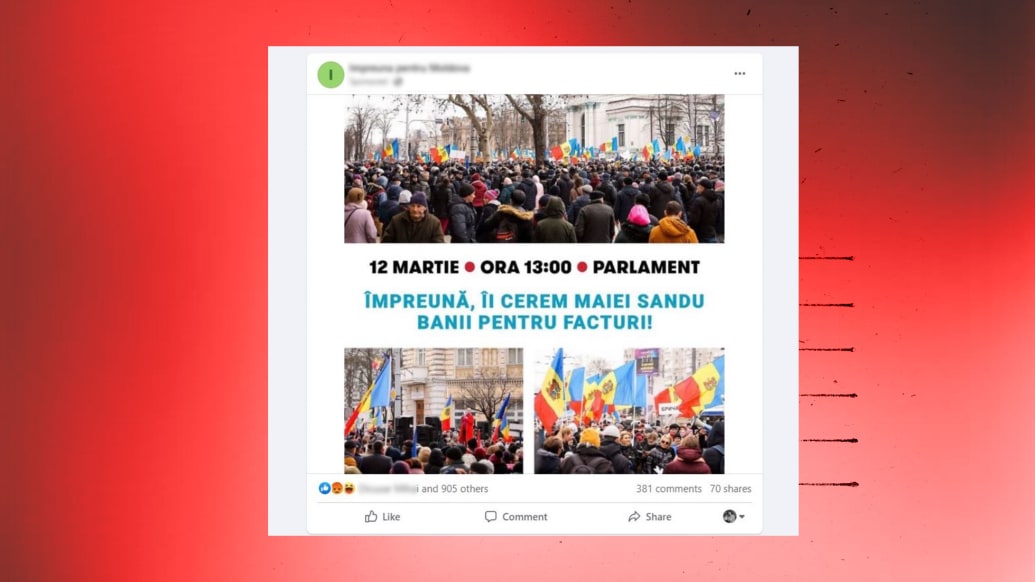Russia is working behind the scenes to run a major influence operation designed to destabilize the current government of Moldova, with the apparent aim of installing a Russia-friendly government, U.S. and Moldovan officials told The Daily Beast.
Signs of the Kremlin’s alleged operation—which aims to subvert the current Moldovan government and foment unrest through protests in Moldova—are evident in both Moldova and Transnistria, the Russia-backed breakaway region in Moldova, a U.S. diplomat who recently visited both of those regions told The Daily Beast.
The ultimate goal is to undermine the pro-Western government of Moldovan President Maia Sandu and sweep the country, which declared independence from the Soviet Union in 1991, back into Russia’s fold, U.S. Ambassador Michael Carpenter told The Daily Beast.
The Russian information operation, which leans on social media and Russian government officials as mouthpieces to amplify tensions in Moldova—both online and in the physical realm—is “intense” right now, said Carpenter, the U.S. Permanent Representative to the Organization for Security and Cooperation in Europe.
“What I clearly observed while I was there was a very intense Russian information operation” focused on amplifying economic concerns in Moldova and aiming “to destabilize the situation and get people worried,” Carpenter told The Daily Beast, adding that Russia is “trying to create uncertainty” and “stir the pot… to create headwinds for this government.”
The campaign is just the latest effort from Russia to try to spread pro-Russian and anti-Western sentiment in post-Soviet states, as Russia continues its war in Ukraine and attempts to claim territories with historical ties to the Soviet Union, the Moldovan Ambassador to the United States, Viorel Ursu, told The Daily Beast.
The warnings about Russian information operations to spur unrest in Moldova come days after Sandu cautioned that Moldova has knowledge of a Russian plot to stage a coup in Moldova, complete with attacks on government buildings and hostage plans.
“Russian authorities have been very clear about their desire to keep the spheres of influence,” Ursu told The Daily Beast. “Russia wants to keep a larger sphere of influence in what they call the ‘near abroad.’”
Concerning signals have been bubbling up for weeks that Russia is interested in subverting the status quo in Moldova. Russia’s Foreign Minister Sergei Lavrov threatened that Moldova could become the “next Ukraine” last month.
The head of Moldova’s Intelligence and Security Services (SIS), Alexandru Musteata, has suggested that Russia could invade Moldova in March or April.
Spillover
The influence operation has consisted of a network of messaging campaigns—from television to social media, including Telegram and Facebook, the Moldovan ambassador said.
Moscow has worked from its typical playbook in recent weeks—the same one it applied to the United States—of reaching into the internal tensions in another country and amplifying them online.
Although there is some existing, organic tension in the country right now about the cost of living, Russia is artificially amping them up, Ursu explained, adding that many of the problems stressing residents in Moldova can be traced back to Russia in the first place. Moldova is almost entirely dependent on Russia for gas, and when Russia shut off the gas in November as part of its efforts to weaponize energy in the Ukraine war, it kicked off a process that has triggered massive inflation in Moldova.
“There is genuine discontent because of the high prices. But it also gives an opportunity for Russia to infiltrate some of the more provocative elements among the protesters,” Ursu told The Daily Beast.
Already, the operation, which has focused on spreading anti-government slogans and encouraging protesters to demand the government pay for electricity, has spilled over into the physical realm. Demonstrators have taken to the streets of Moldova in recent months, demanding the government help residents with energy bills and a Sandu ouster.
Russia-friendly political elements with links to the pro-Kremlin Shor party in Moldova have backed the protests with financing from Moscow, according to Moldova’s government.
The Shor party has also been helping provide training to demonstrators in Moldova, according to local media. The party recently sent 80 young people from Chisinau and from other districts in Moldova to Turkey in order to train them on how to cause disorder during protests, including by breaking police cordons and throwing stones and smoke bombs, border police sources told Deschide.MD.
The White House National Security Council confirmed in a call Friday that it believes Russia may be backing protests in Moldova.
Trouble in paradise
Moldova’s uphill battle with influence ops has been complicated by its struggle in getting social media companies to step up monitoring and blocking influence campaigns online.
Ilan Shor, the oligarch behind the Shor party, worked with Moscow-based entities and Russian individuals to foment unrest in Moldova and undermine Sandu in preparation for the 2021 elections, according to the U.S. Treasury Department. The Treasury sanctioned Shor last year for election interference.
It’s a step that should, in theory, prohibit dealings with Shor and related entities. But social media companies’ efforts to tamp down on Shor-linked ops have floundered.
Although Facebook removed Shor’s ability to post ads on Facebook apps after he was sanctioned, some Shor posts are still slipping through. Facebook has allowed ads from Shor encouraging demonstrators to take to the streets in Moldova in recent weeks, despite sanctions.
An example of an ad tied to pro-Russia network of social media trolls on Facebook.
Courtesy of DFRLab
Facebook, after detecting some activity and receiving tip-offs from civil society in Moldova, removed the ads. A Meta spokesperson stressed that Facebook adheres to U.S. sanctions law in comments to The Daily Beast.
Still, the social media arm of Russia’s influence operation has been exploiting gaps in companies’ ability to monitor and curtail such operations online.
In some cases, the pro-Russia party has been been attempting to fly under the radar by making pages on Facebook with different names, but using the same pictures, which is a dead giveaway that they are linked, according to research the Atlantic Council’s Digital Forensic Research Lab (DFRLab) shared with The Daily Beast.
“Every time Facebook shuts them down, they create new pages,” Victoria Olari, who studies disinformation in Moldova for DFRLab, told The Daily Beast. “It’s very difficult to track these pages.”
Moldova’s government has pressed Facebook to step up efforts to track and block pro-Russian influence campaigns targeting Moldova, but problems remain, Ursu said.
“He continues to place paid advertisements on Facebook, and we’ve been complaining many times to Meta… to put restrictions on these advertisements,” Ursu said, referring to Shor. “It’s been a catchup game. We still continue seeing proliferation of those paid advertisements.”
On Friday, DFRLab identified a new active ad tied to Shor that promotes a protest date this Sunday. Like other Shor ads, it is aimed at spreading anti-government slogans and encourages protesters to demand the government pay for residents’ electricity and gas bills.
“Are we really prepared?”
The ad has telltale signs that the Shor party is “absolutely” behind it, Olari said.
The movement also has an associated page and several associated fake accounts that comment on the page in an apparent attempt to generate artificial attention for the cause, according to DFRLab.
“Troll farms are working on their pages, promoting their posts,” Olari said. “They’re just creating activity on the page.”
Facebook acknowledged social media account farms have been attempting to acquire Shor’s pages and accounts and said it is working to continue to take action.
Moldova has been working to limit Russian disinformation in the country by blocking Russian channels. But that doesn’t necessarily help filter out Russian disinformation from every generation, Ursu acknowledged, noting that Facebook, Telegram, and TikTok are more popular among the younger set.
Moscow has been working to spread the false narrative that Ukraine is preparing to invade the Russia-backed breakaway region of Transnistria on Telegram for the last two weeks, according to DFRLab research.
Just this week, authorities in Russia-backed Transnistria have accused Ukrainian intelligence of harboring a plot to assassinate the Transistrian leaders. Ukraine has denied the allegations and said they are a Kremlin provocation.
The plot
Alongside warnings about the coup plot, Moldovan officials have been raising alarm bells about potential military action from Russia for weeks. But multiple officials told the Daily Beast the primary concern right now is that Russia is attempting a coup plot aimed at exacerbating tensions, causing chaos in the streets of Moldova, and weakening or eliminating the Moldovan government’s control of the country.
“I don’t see any threats in or around Moldova of a military nature,” Carpenter said.
Russia has many of its resources tied up in eastern Ukraine, so military action in Moldova might not be the natural next step, according to the National Security Council.
That is why it is likely relying on propaganda that can stir unrest, Matthew Orr, a Eurasia analyst at risk intelligence firm RANE, told The Daily Beast.
“It doesn’t like this Moldovan government. The problem is that it doesn’t really have a path for doing much about it,” Orr said. “That’s what this coup talk is about.”
Part of Russia’s motivation for targeting Moldova may be a ploy to discourage Western governments from supporting Ukraine. As the thinking goes, for those fearful of domestic dissent about the cascading consequences of war, such as inflation and rising energy prices, watching chaos unfold in Moldova could serve as a lesson.
“They also wanted to scare,” Orr said. “Moldova is not directly participating in the war. If they’re being enveloped by a protest movement over alleged falling living standards and high energy and electric prices, then European governments can say, ‘Hold on, could the same thing ferment? Are we really prepared for that?’”



